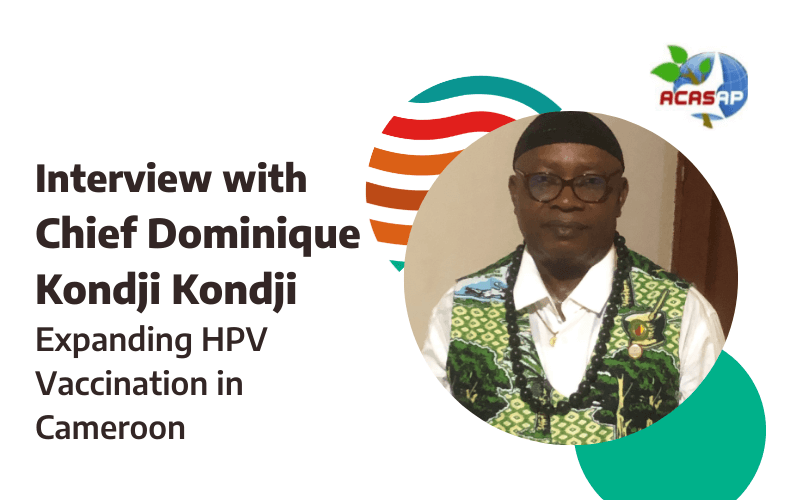
Expanding HPV Vaccination in Cameroon: An Interview with Chief Dominique Kondji Kondji; President, Cameroon Public Health Association (CAMPHA) and Diplomat of the Global Charter for the Public’s Health (WFPHA)
News
Sep 24, 2024
The Human Papillomavirus (HPV) is a group of viruses of more than 100 strains and is the leading cause of cervical cancer in women. HPV also causes other malignancies, including oropharyngeal, anal, penile, vulvar and vaginal. Traditionally, HPV programs take a girls-focused approach, but increasing evidence highlights the importance of vaccinating boys as well. HPV gender-neutral vaccination (GNV) provides comprehensive community protection, builds herd immunity, and improves health outcomes.
The World Federation of Public Health Associations (WFPHA) has been at the forefront of promoting HPV GNV and developing various initiatives to advance this cause. In May 2024, the WFPHA organized a high-level side event alongside the 77th World Health Assembly (WHA) in Geneva, focusing on gender-neutral HPV vaccination strategies, advocating for global implementation, and raising awareness of the critical need for these programs. Additionally, the WFPHA has expanded its outreach by launching a series of online trainings in native languages for select countries, ensuring their message reaches a broader and more diverse audience.
Although HPV gender-neutral vaccination is standard in many high-income countries, this is not the reality in many low- and middle-income countries (LMICs). This is particularly true in Africa, where only a few countries include boys in their HPV vaccination programs. Cameroon stands out as one of the few LMICs to have successfully implemented gender-neutral HPV vaccination. In a recent conversation with Chief Dominique Kondji Kondji, President of the Cameroon Public Health Association, we delved into the country’s progressive HPV vaccination program.
Can you tell us about the origins of the HPV vaccination program in Cameroon?
Dominique: The HPV vaccination initiative began for girls in the Cameroon Baptist Convention HospitalsServices (CBCHS) between 2010 and 2012. Good cultural influences and good support for the program led to its success in the two Anglophone regions where the vaccinations were first initiated. The Cameroon government, with the support of its partners, subsequently took over the program and conducted a successful pilot in two health districts (Edéa in the Littoral region and Foumban in the West region), both with positive results (2014-2016). The expansion of this program was mainly supported by Gavi, who played a crucial role.
When did the program start targeting a broader population?
Dominique: In 2020, Cameroon introduced nationwide HPV vaccination for girls within its Expanded Program on Immunization (EPI). The following year, in 2022, the Cameroon government extended the vaccination program to include boys. This marked the shift towards a gender-neutral approach. Cameroon has been practising HPV Gender-Neutral Vaccination since 2022.
What challenges did Cameroon face during the implementation
Dominique: Several problems were identified during the initial stages of the implementation process. Firstly, communities were poorly informed and did not understand the need for HPV vaccination. Secondly, the vaccination program was met with resistance from some stakeholders, including several religious institutions. The Ministry of Public Health addressed these challenges through advocacy endeavors and dialogues with stakeholders and communities, helping them understand the need for HPV gender-neutral vaccination and its benefits. GAVI-sponsored projects conducted by its local partners contributed to promoting the introduction of the HPV vaccine for girls and boys. Furthermore, the Parliament actively promoted addressing these issues by highlighting the significance of HPV vaccination and effectively communicating its importance to the public.
How is the HPV vaccination program funded?
Dominique: The Cameroon government provides partial funding for the HPV vaccination program. In addition, Cameroon receives support from Gavi, UNICEF, WHO, and the World Bank. Of these, Gavi is a crucial supporter of Cameroon’s HPV vaccination program, including the procurement of vaccines for boys.
How is the vaccination program currently being implemented
Dominique: When the HPV vaccination program began, it was rolled out through schools. This lasted for about six months to 1 year. After that, we transitioned to delivering vaccinations through health facilities. The vaccination program leverages mass media, schools, decentralized councils, the Ministry of Public Health, and other allied ministries such as Education, Social Affairs, and Women’s Empowerment to ensure that parents and caregivers are advised and encouraged to get vaccinated their children and girls and boys adolescents at these health facilities.
What improvements are needed moving forward?
Dominique: We need to enhance our communication strategies, particularly locally. Although central communication plans and materials are developed, they need to be adapted to fit local contexts to be more effective. This can be further improved to enhance understanding at a peripheral level and, in turn, vaccination rates.
Cameroon’s experience expanding its HPV vaccination program to align with gender-neutral vaccination practices is a compelling example for other low- and middle-income countries hoping to broaden their HPV vaccination programs. By navigating cultural, logistical, and educational challenges, Cameroon has demonstrated that with strong governmental commitment, international collaboration, and community engagement, it is possible to implement inclusive and effective vaccination programs to protect populations from preventable diseases.
